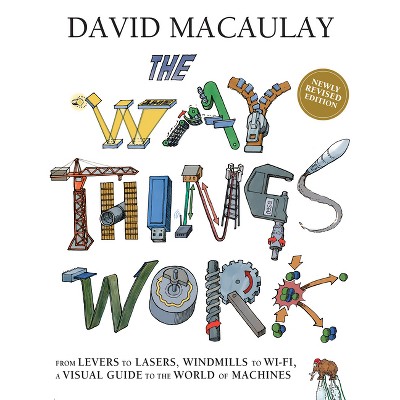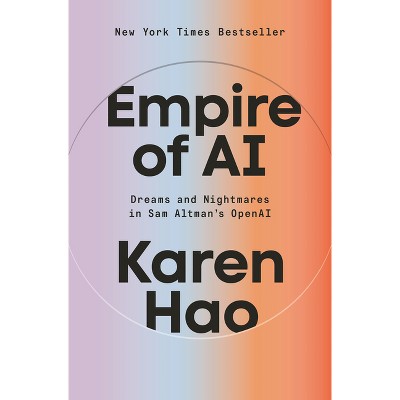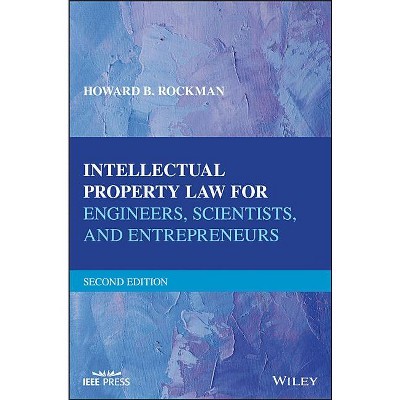Understanding Artificial Intelligence - by Albert Chun-Chen Liu & Oscar Ming Kin Law & Iain Law (Hardcover)

About this item
Highlights
- Understanding Artificial Intelligence Provides students across majors with a clear and accessible overview of new artificial intelligence technologies and applications Artificial intelligence (AI) is broadly defined as computers programmed to simulate the cognitive functions of the human mind.
- About the Author: Albert Chun Chen Liu, Ph.D., is the CEO of Kneron and an Adjunct Associate Professor at National Tsing Hua University, National Chiao Tung University, and National Cheng Kung University, Taiwan.
- 224 Pages
- Computers + Internet, Intelligence (AI) & Semantics
Description
About the Book
"This is an introductory book for professionals and undergraduate students without any background in artificial intelligence. The book describes how the new artificial intelligence technology, neural network, totally changes our everyday life. It first describes the neural network development history and introduces the classical neural network -- convolutional neural network architecture. After that, it covers the artificial development in six different areas; healthcare, finance, retail, manufacturing, agriculture, and smart city. This book targets students with different backgrounds, such as, business, humanity, arts, science and engineering, allowing them to understand the artificial intelligent general applications and how this impacts on their future."--Book Synopsis
Understanding Artificial Intelligence
Provides students across majors with a clear and accessible overview of new artificial intelligence technologies and applications
Artificial intelligence (AI) is broadly defined as computers programmed to simulate the cognitive functions of the human mind. In combination with the Neural Network (NN), Big Data (BD), and the Internet of Things (IoT), artificial intelligence has transformed everyday life: self-driving cars, delivery drones, digital assistants, facial recognition devices, autonomous vacuum cleaners, and mobile navigation apps all rely on AI to perform tasks. With the rise of artificial intelligence, the job market of the near future will be radically different many jobs will disappear, yet new jobs and opportunities will emerge.
Understanding Artificial Intelligence: Fundamentals and Applications covers the fundamental concepts and key technologies of AI while exploring its impact on the future of work. Requiring no previous background in artificial intelligence, this easy-to-understand textbook addresses AI challenges in healthcare, finance, retail, manufacturing, agriculture, government, and smart city development. Each chapter includes simple computer laboratories to teach students how to develop artificial intelligence applications and integrate software and hardware for robotic development. In addition, this text:
- Focuses on artificial intelligence applications in different industries and sectors
- Traces the history of neural networks and explains popular neural network architectures
- Covers AI technologies, such as Machine Vision (MV), Natural Language Processing (NLP), and Unmanned Aerial Vehicles (UAV)
- Describes various artificial intelligence computational platforms, including Google Tensor Processing Unit (TPU) and Kneron Neural Processing Unit (NPU)
- Highlights the development of new artificial intelligence hardware and architectures
Understanding Artificial Intelligence: Fundamentals and Applications is an excellent textbook for undergraduates in business, humanities, the arts, science, healthcare, engineering, and many other disciplines. It is also an invaluable guide for working professionals wanting to learn about the ways AI is changing their particular field.
From the Back Cover
Provides students across majors with a clear and accessible overview of new artificial intelligence technologies and applications
Artificial intelligence (AI) is broadly defined as computers programmed to simulate the cognitive functions of the human mind. In combination with the Neural Network (NN), Big Data (BD), and the Internet of Things (IoT), artificial intelligence has transformed everyday life: self-driving cars, delivery drones, digital assistants, facial recognition devices, autonomous vacuum cleaners, and mobile navigation apps all rely on AI to perform tasks. With the rise of artificial intelligence, the job market of the near future will be radically different many jobs will disappear, yet new jobs and opportunities will emerge.
Understanding Artificial Intelligence: Fundamentals and Applications covers the fundamental concepts and key technologies of AI while exploring its impact on the future of work. Requiring no previous background in artificial intelligence, this easy-to-understand textbook addresses AI challenges in healthcare, finance, retail, manufacturing, agriculture, government, and smart city development. Each chapter includes simple computer laboratories to teach students how to develop artificial intelligence applications and integrate software and hardware for robotic development. In addition, this text:
- Focuses on artificial intelligence applications in different industries and sectors
- Traces the history of neural networks and explains popular neural network architectures
- Covers AI technologies, such as Machine Vision (MV), Natural Language Processing (NLP), and Unmanned Aerial Vehicles (UAV)
- Describes various artificial intelligence computational platforms, including Google Tensor Processing Unit (TPU) and Kneron Neural Processing Unit (NPU)
- Highlights the development of new artificial intelligence hardware and architectures
Understanding Artificial Intelligence: Fundamentals and Applications is an excellent textbook for undergraduates in business, humanities, the arts, science, healthcare, engineering, and many other disciplines. It is also an invaluable guide for working professionals wanting to learn about the ways AI is changing their particular field.
About the Author
Albert Chun Chen Liu, Ph.D., is the CEO of Kneron and an Adjunct Associate Professor at National Tsing Hua University, National Chiao Tung University, and National Cheng Kung University, Taiwan.
Oscar Ming Kin Law, Ph.D., is the director of engineering at Kneron. He has over 20 years of experience in the semiconductor industry and has published more than 70 patents in various areas.
Iain Law studies Economics and Data Science at the University of California, San Diego. He has worked on several artificial intelligence projects including the LEGO smart robot and DJI Tello smart drone for STEM education.
Shipping details
Return details
Trending Computers & Technology Books











